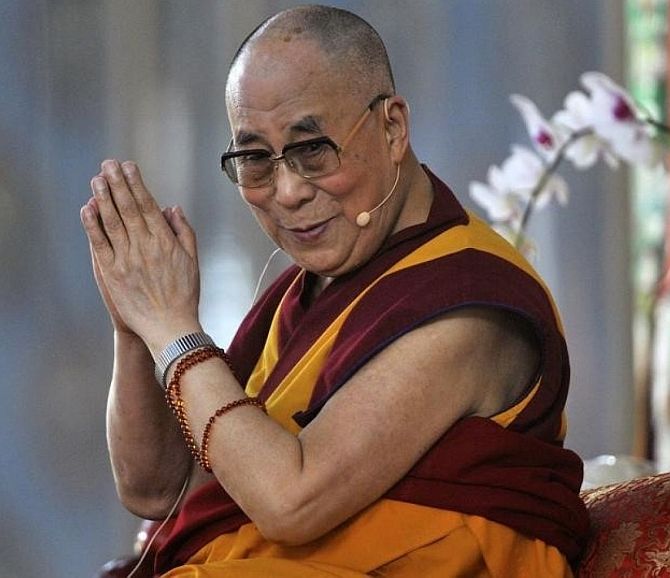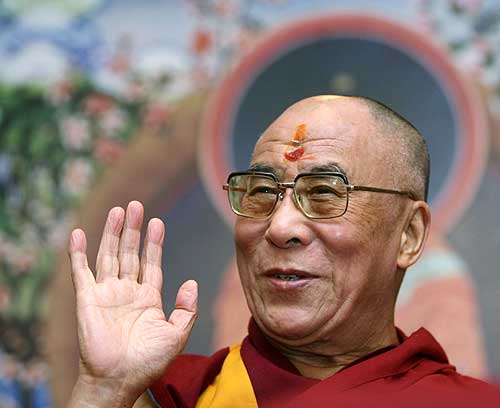Sidestepping Chinese opposition, United States President Barack Obama will meet the Dalai Lama at the White House on Wednesday, a move likely to infuriate China which considers the exiled Tibetan spiritual leader as a separatist.

"In the morning, the President will meet with His Holiness the Dalai Lama at the White House," said the presidential schedule.
The meeting to be held in the Map Room of the White House is closed press. The Tibetan spiritual leader is currently on a visit of the US.
Normally, the US President meets the Tibetan spiritual leader when he is in the American Capital.
In the past, the White House has maintained that the US President meets the Dalai Lama in his capacity as religious and spiritual leader.
Despite the US believing that Tibet is an integral part of China, every meeting of the Dalai Lama with the American President angers Beijing.
"As a revered figure to Tibetans and people around the world, His Holiness reminds us of our great responsibility to act to safeguard human rights, promote equality and protect our environment," said top Democratic Leader Nancy Pelosi.
"Any attempt on the part of the Chinese to dilute the population of Tibetans in Tibet is something that would be just really wrong. Just plain and simple: wrong. Again, a challenge to the conscience," she said.
Welcoming Obama's decision to meet the Dalai Lama, Pelosi said Tibetan spiritual leader's friendship with the US and the respect commanded from leaders on both sides of the aisle serve "as a powerful tribute to the righteousness of the cause of Tibetan autonomy."
"If freedom-loving people do not speak out against oppression in Tibet, then we surrender all moral authority to speak on behalf of human rights anywhere in the world," Pelosi said.
Senators Bob Corker and Ben Cardin, the chairman and ranking member of the powerful Senate Foreign Relations Committee, met with the Dalai Lama and Lobsang Sangay, the prime minister of the Tibetan government in exile.
"At a time when our country is grappling with an increasingly unstable and uncertain world, we are inspired by his universal message, which reflects many of our own deeply-held values," Corker said, adding that they discussed about issues important to the US and the people of Tibet.
"As I continue to underscore the importance of protecting and uplifting basic human rights in the foreign policy of the United States as well as in the work of our partners and allies abroad, the Dalai Lama remains a source of inspiration and guidance to me," Cardin said.
Speaking on the House floor, Democratic Minority leader Nancy Pelosi welcomed the decision of the US President to meet the Tibetan spiritual leader.
"I know that President [Obama] will be receiving His Holiness this week. Presidents have done that over time, which is a source of great pride for us in our country and in the relationship between His Holiness and our presidents," Pelosi said.
Pelosi said the relationship between an American President and His Holiness the Dalai Lama goes back to when he was a little boy and it persists into his 80s now, something that, again, "brings luster to us in our country that we have such a beautiful relationship" with such a spiritual figure in the world.
"Honoured to see the Dalai Lama today, who continually inspires us to choose love over hate," tweeted Congressman Tim Walz.
Congressman Suzan K Delbene said over the past several years, the Chinese government had constructed more obstacles to efforts by Tibetans to preserve their culture and religion.
"Sadly, we know that Tibetans have used self-immolations as a protest against the religious and political oversight of the Chinese government. It is difficult to fathom the despair and desperation felt by Tibetans who take this last act of defiance," she alleged.
"The Chinese government has blamed the Dalai Lama and "foreign forces" for self-immolations instead of looking at how their own policies created such deep grievances," she said.
"The Chinese government also expanded its efforts last year to transform Tibetan Buddhism into a state-managed institution. They sought to undermine the devotion of the Tibetan people to the Dalai Lama and control the process of selecting Buddhist leaders," Delbene said.











 © 2025
© 2025